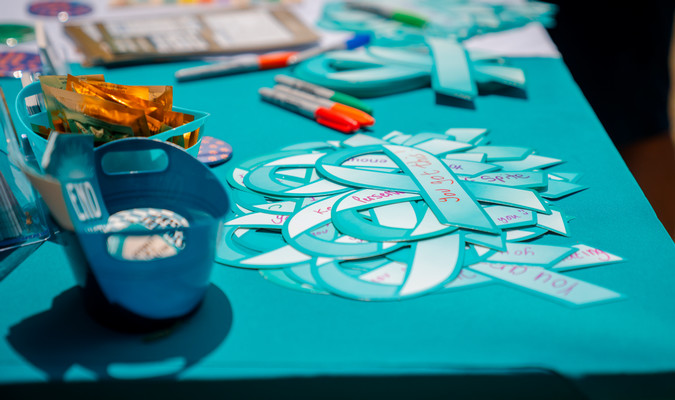Sexual Violence
According to the Centers for Disease Control and Prevention (CDC), sexual violence is any sexual act that is perpetrated against someone's will. Sexual violence encompasses a range of offenses, including a completed nonconsensual sex act (i.e., rape), an attempted nonconsensual sex act, abusive sexual contact (i.e., unwanted touching) and non-contact sexual abuse (e.g., threatened sexual violence, exhibitionism, verbal sexual harassment). All types involve victims who do not consent, or who are unable to consent or refuse to allow the act.
Clemson University’s Non-Discrimination and Anti-Harassment Policy includes:
- Sexual assault and/or battery
- Sexual coercion
- Sexual misconduct
- Domestic violence
- Stalking
-
Fast Stats
-
19.3% (or more than 23 million) women in the United States have been raped during their lifetimes.
-
An estimated 43.9% of women experienced sexual violence other than rape during their lifetimes.
-
Approximately one in four women (23.7%) and 10.8% of men are estimated to have experienced some form of unwanted sexual contact during their lifetimes.
-
The majority of victims of all types of sexual violence knew their perpetrators (including stalking).
-
In the United States, an estimated 15.2% of women (18.3 million) and 5.7% of men (6.5 million) have experienced stalking during their lifetimes that made them feel very fearful or made them believe that they or someone close to them would be harmed or killed.
-
An estimated 31.5% of women and 27.5% of men have experienced physical violence by an intimate partner in their lifetimes.
-
An estimated 47.1% of women and 46.5% of men experienced at least one act of psychological aggression by an intimate partner during their lifetimes.
-
-
Sexual Assault Research at Clemson University
720 first-year female Clemson University students participated in a study funded by the National Institutes of Health and conducted by faculty in Public Health Sciences and Redfern Health Center. The study used behavioral-specific questions from the Sexual Experiences Survey to assess for sexual victimization. It assesses for completed rape, attempted rape, sexual coercion (intercourse subsequent to verbal pressure or misuse of authority) and unwanted sexual contact.
When compared to national data, Clemson University data are consistent with national level data. This indicates that sexual victimization on our campus is no more or no less of a problem than other college campuses.
Findings of the study:- Approximately 20% of first-year women at Clemson University experience some type of sexual victimization:
- 15% experienced unwanted sexual contact
- 5% experienced sexual coercion
- 5% experienced attempted rape
- 3% experienced completed rape
- Alcohol was involved two out of three times: 56% of women and 60% of men had used alcohol just prior to the incident.
- Most women knew the offender: 37% were acquaintances, 32% were partners or romantic acquaintances, 23% were casual or first date and 8% were strangers.
- Victims were more likely to report increased levels of depressive and post-traumatic stress symptoms compared to non-victims, so it is very important they seek help.
Thompson, M.P. & Kingree, J.B. (2010). Sexual victimization, negative cognitions, and adjustment in college women. American Journal Health Behavior, 34, 55-59.
- Approximately 20% of first-year women at Clemson University experience some type of sexual victimization:
-
Alcohol and Perpetration
Characteristics of Sexual Assault Perpetrators
- Social status and access to consensual sex
- Attitudes toward women and casual sex
- Endorse problematic alcohol expectancies and beliefs
Strategies of Serial Predators
- Stalking vulnerability
- Grooming of victim
- Intentionally increase vulnerability
- Isolations of victim
- Cognitive distortions
- Do not use weapon; alcohol is primary tool
- Use of instrumental, not gratuitous violence
Role of Alcohol
- Enabler
- Confounder
- Facilitator
- Scapegoat
Drink Spiking -
Reasons Why Victims May Not Report Sexual Violence
Sexual assault victims commonly struggle with a range of emotions that make it difficult for them to report or disclose abuse. Some reasons might include the following:
-
Often, victims who do report will delay doing so for a variety of reasons that are connected to neurobiological and psychological responses to their assault.
-
Victims may worry about how reporting will affect their family or friends. Further, they may be fearful of family fracture if the person sexually assaulting them is a family member.
-
Some victims distrust law enforcement.
-
Completing the forensic exam or “rape kit” can be difficult for victims for many reasons.
-
It is important to know that forensic exams can be anonymous, and the victim can say “no” to any part of the exam.
-
It is important to remember that victims have rights, and crisis center advocates can help victims through the process and explain the options victims have.
-
-
Victims fear that they will not be believed or fear retaliation. Often, victims are pressured by others not to tell.
-
Many times victims don’t want to report because they don’t want to “ruin their life,” but it is important to remember the following:
-
Reporting may help other victims who were assaulted by the same person
-
Reporting may help prevent the assailant from perpetrating again on potential future victims
-
On college campuses, victims can chose to report and not move forward with a criminal or college disciplinary process*
-
-
The only time a college disciplinary Title IX investigation has to move forward is if the assailant has previously been accused because it indicates a pattern and hostile environment that needs to be addressed.
Campbell, R., & Raja, S. (1999). Secondary victimization of rape victims: Insights from mental health professionals who treat survivors of violence. Violence and Victims, 14, 261-275.
D’Anniballe, J. (2010, February). Understanding the neurobiology of trauma: The impact on children and adults. Presentation at the Deepening Our Roots: Growing Meaningful & Sustainable Sexual Assault Services in Rural Communities conference, San Diego, CA.
-

Sexual assault is NEVER the survivor’s fault. There are many on- and off-campus support services and resources available to victims of sexual assault.
